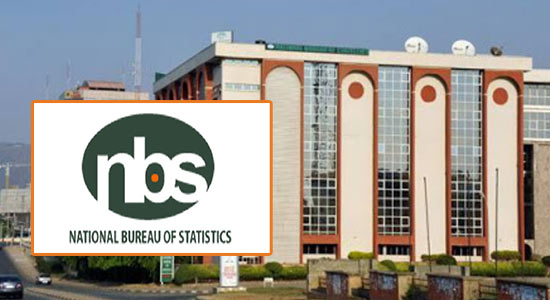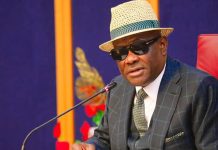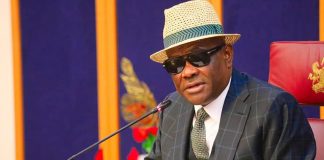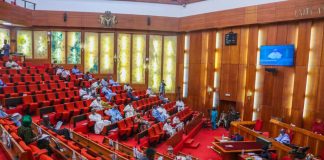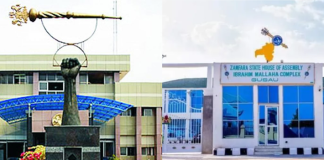🌿 Ruzu Non-Alcoholic Herbal Bitters
Ruzu Non-Alcoholic Herbal Bitters is a natural health supplement specially formulated to:
- ✅ Promote general wellness
- ✅ Detoxify the body
- ✅ Support the treatment of various ailments
Made from a powerful blend of 100% organic and medicinal herbs, Ruzu is completely alcohol-free, making it ideal for:
- 👪 All age groups
- 🌱 Health-conscious individuals
- 🌿 Anyone seeking non-alcoholic herbal remedies
Whether you're looking to boost your vitality, cleanse your system, or support healing the natural way, Ruzu Bitters offers a trusted herbal solution.
Nigeria’s economy surprised even some optimistic analysts by growing 4.2 percent year over year in the second quarter of 2025, its best growth in four years. However, experts emphasized much more work needs to be done.
Researchers and policy analysts have praised the National Bureau of Statistics’ (NBS) headline figure, which they regard as proof that reforms and increased oil production are taking hold. However, there is a chorus of caution about how long-lasting the rebound is behind the applause.
Widespread Applause
Although the result indicates progress, it also reflects changes in measurement as much as in actual output, according to renowned economist and government adviser Bismarck Rewane.
“This is mostly because of the GDP’s rebasing and the inflation basket’s reconstitution, which have helped to reflect the state of the economy and control inflation,” Rewane said.
His argument emphasizes that rather than a general increase in output, some of the lift might be due to statistical adjustments. Recently, Nigeria’s GDP was recalculated to better reflect emerging sectors like fintech and digital services, which can provide the impression of larger growth even when the underlying activity is more modest.
Analysts See a Watershed in Policy
The most recent data is a watershed, according to London-based Capital Economics, which predicted in January that Nigeria’s tightening cycle was about to peak. The Central Bank of Nigeria (CBN) recently lowered the Monetary Policy Rate by 50 basis points, which the firm welcomed as “validation that the shift toward easing is under way.” The firm had anticipated a rate decrease of roughly 400 basis points by year’s end.
Similar optimism was expressed by local investment firm Afrinvest, which described the 4.2 percent expansion as “a potential inflection point” provided that oil output keeps improving and foreign exchange markets stay steady.
A softer monetary posture is gaining credibility due to disinflation, according to the EcoFin Agency. EcoFin stated that “the CBN has room to cautiously pivot toward growth support” as headline inflation eased to 20.1 percent in August and naira pressure subsided. However, it cautioned that fiscal slack or external shocks, like a precipitous decline in oil prices, may swiftly undo gains.
More Relief Is Wanted by the Private Sector
When financial markets are generally happy, the real economy is a little more cautious.
Although the minor rate drop by the CBN was welcomed, the Manufacturers Association of Nigeria (MAN) deemed it to be insufficient. Segun Ajayi-Kadir, the director general, argued that in order for manufacturers to extend their operations significantly, financing costs “must fall well below 10 percent.”
That opinion was also expressed by the Nigeria Employers’ Consultative Association (NECA). Adewale Oyerinde, its director general, issued a warning that the high Cash Reserve Ratio (CRR), which maintains a sizable portion of bank deposits protected at the central bank, could stifle the expansion of credit and mitigate the effects of lower policy rates.
Advocates for small businesses share that concern. The rate drop was described as “a good start but insignificant” by Dr. Femi Egbesola, president of the Association of Small Business Owners, who advocated for targeted lending windows to provide access for micro and small businesses that are still unable to obtain inexpensive funding.
Still Present Structural Headwinds
In addition to monetary policy, economists draw attention to ongoing structural issues.
“The future of Nigerian growth lies in ICT, real estate, and fintech—areas that require sustained infrastructure investment and regulatory clarity,” according to economist Stephen Iloba, notwithstanding the oil sector’s remarkable recovery.
A significant portion of the population still works in agriculture, which is nevertheless susceptible to climate shocks and insecurity. Rising violence lowers crop and livestock productivity, threatening food security and rural incomes, according to a recent research study from Benue State.
The speed at which new loans or investment may result in increased output is also hampered by infrastructure deficiencies, ranging from electricity to transportation logistics. “The multiplier effect of monetary easing will be capped if power and transportation bottlenecks are not addressed,” stated Chioma Eze, head of research at AlphaCapital.
Investors Strike A Balance Between Caution and Optimism
Although many still hedge, portfolio managers have responded favorably to the facts. “The growth figure is encouraging, particularly when paired with moderate inflation,” stated Olumide Ogun, a major investment bank’s West Africa strategist. “However, maintaining it calls for consistent policy implementation, not just a quarter of strong oil production.”
Particularly sensitive to exchange-rate policy are foreign investors. According to Marie Dubois of MacroVue Partners, a firm located in Geneva, “the naira has been relatively stable, but it’s fragile.” “Capital inflows could be swiftly reversed by any policy blunder that rekindles FX volatility.”
An Act of Delicate Balancing
The majority of observers concur that Nigeria is in a greater situation now than it was a year ago, notwithstanding the warnings. An increase in oil production, aided by increased security in the Niger Delta, provides fiscal breathing room, and the CBN’s cautious relaxation shows confidence that inflation is on a downward trajectory.
The foundation of the economy is still precarious, though. High unemployment and poverty highlight the need for rapid and inclusive growth, while a heavy reliance on oil revenues makes public finances susceptible to fluctuations in the world economy.
“Our base case for Q3 growth is 3.9 to 4.4 percent, assuming oil output holds and FX markets remain orderly,” summarizes Afrinvest’s consensus. But rapid structural changes and careful macromanagement are needed to convert headline GDP increases into widespread prosperity.
The Path Ahead
Therefore, Nigeria’s second-quarter increase is both a warning and a milestone. The figures demonstrate what might happen when monetary policy starts to ease and oil flows improve. However, it also emphasizes how much more has to be done, including boosting credit channels, diversifying the economy away from oil, reducing structural inflation, and increasing infrastructure spending.
The caution is as real as the applause. According to a fund manager in Lagos, “The numbers are good.” Now, the execution is much more crucial.

